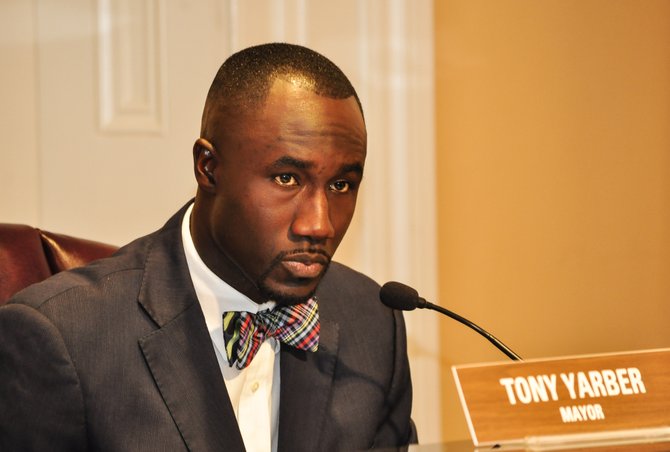During a morning briefing with reporters, Yarber conceded that the Lakeland site, which required the rezoning of 50 acres of land and the likely removal of Smith-Wills Stadium, might be unworkable. However, he added that Costco is now willing to work with the city for another location. Photo by Trip Burns.
Despite several current and former city officials characterizing an area along Lakeland Drive as non-negotiable for Mississippi's first Costco store, the company has softened its stance, Mayor Tony Yarber says.
During a morning briefing with reporters, Yarber conceded that the Lakeland site, which required the rezoning of 50 acres of land and the likely removal of Smith-Wills Stadium, might be unworkable. However, he added that Costco is now willing to work with the city for another location.
"We think there's a little bit of leverage that we have now that we didn't have before," Yarber said without going into specifics.
The Jackson Planning Board had already voted against the zoning recommendation and it is unclear if the measure has support on the Jackson City Council. After one delay, the council was expected to hear an appeal Oct. 20, but Yarber said this morning that his administration would not pursue the Lakeland rezoning on that date.
Yarber has hinted in recent weeks that the city might jettison Lakeland. In an interview with WAPT, Yarber said: "Whether it's (on Lakeland) or other flourishing areas on (Interstates) 55, 20 or 220, it remains to be seen. Costco has made clear to us over the last couple of weeks that their commitment is to be in this market."
Costco has also expressed interest in two other locations along Lakeland Drive in Rankin County, but stringent liquor laws in that area make them less desirable for the retailer. Although pursuing the store, which pays higher than average retail wages, remains a priority, Yarber says his administration has "pumped the brakes" somewhat on a Costco store in order to engage stakeholders and other members of the community who might be affected by the wholesaler's entrance into the market.
Costco chose the site after researching the traffic of the area and calculating the profits it would bring. The big-box store has shown interest in two other Flowood locations on Lakeland Drive—both in Rankin County, which is largely dry. Costco is reserved about the Flowood locations for that reason, but Jackson leaders worry that if Flowood can accommodate Costco's requirements while Jackson refuses, it could be an economic blow to the city.
Yarber said Costco previously had given the city mandates, but now their approach is "a little softer."
In the briefing, Yarber also touched on a recent water-main break in downtown. As a result of the rupture, public-works officials requested an analysis of the main in anticipation of possible legal action, perhaps from the business owners who have been affected by the construction.
Responding to the recent controversy over hiring a consultant to review the water department's finances, Yarber pointed out that the city is losing about $750,000 in potential water revenue as a result of old, leaky pipes that result in the city losing 40 percent of its treated water. The mayor said the city is working to streamline business operations in the water department.
He also cautioned against what he said is a popularly held idea that the implementation of the 1-percent sales tax would be a cure-all for the city's infrastructure problems. A change to the structure of the tax, which took place in the final days of the legislative session and after the death of Mayor Lumumba, will mean less revenue for the city that anticipated.
Yarber has said he will decline to fight that particular change because the legislation also allowed the city to extend the life of the sales tax and gave the city the opportunity to borrow money sooner.



Comments